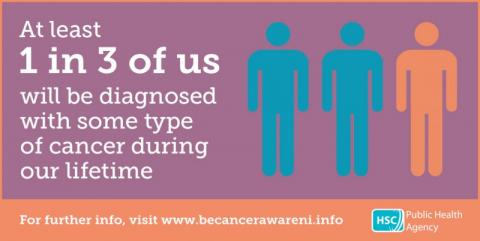Sarcoma Awareness Month – do you know what to look for?

July is Sarcoma Cancer Awareness Month, so the Public Health Agency (PHA) is highlighting the key signs and symptoms of sarcoma cancer and is urging people to talk to their GP if they think something is wrong.
Sarcomas are rare malignant tumours that arise from transformed cells of the connective tissues such as muscle, fat, cartilage or bone. Around 8 out of 10 sarcomas occur in soft tissue although they can affect any part of the body.
Dr Miriam McCarthy, Consultant in Public Health Medicine at the PHA, said: “There were 102 cases of sarcoma diagnosed in Northern Ireland in 2014. Cancers of the bone and connective tissue (sarcomas) are rare, but they can arise in any part of the body and there are many different types. The earlier a cancer is picked up, the easier it is to treat it and the more likely the treatment is to be successful.
"We know that teenagers and young adults do not often develop cancer but bone sarcomas can affect this age group and therefore it is worth knowing a few of the possible signs of a bone sarcoma. These may include:
• increasing, unexplained or persistent bone pain or tenderness, particularly pain at rest (and especially if not in the joint);
• swelling over the affected part;
• reduced movement;
• if the cancer is near a joint, this can make it more difficult to move the joint and it can affect the movement of the whole limb;
• if the affected bone is in the leg, it may cause a limp;
• if the tumour is in the spine, it may press on nerves, causing weakness or numbness and tingling in the limbs;
• broken bone (bone cancer is sometimes discovered when a bone that has been weakened by cancer breaks spontaneously or after a minor fall or accident).
Dr McCarthy continued: “If you do experience these symptoms it is best to seek advice from your GP.
“With advances in treatment and care over recent years there is often a lot that can be done to tackle cancer when it appears, but early detection and treatment are essential. It is important to know your own body, look out for any changes and speak to your doctor if something isn’t right.”
Francie Coyle from Paul’s Campaign said: “We set up Paul’s Campaign after losing our son Paul to sarcoma cancer at the age of 28 in 2011. Since Paul’s death, the campaign has been working to highlight awareness of the condition and impress upon all concerned the vital need for early detection and diagnosis. On Saturday 30 July at 3pm we are going to walk around the Derry/Londonderry city walls in yellow to highlight sarcoma cancer awareness.
“Paul’s Campaign would like to highlight that any suspicious lumps, bumps or swelling in any part of the body should be checked out by a GP. If the lump, bump or swelling increases or changes please go and get medical advice urgently, as early detection for sarcoma cancers is vital. It could save your life.”
For further information about Paul’s Campaign or the walk on Saturday 30 July see: www.facebook.com/Pauls-Campaign-1395524224058670/
The PHA has developed a comprehensive website at www.becancerawareni.info which provides information about cancer signs and symptoms, explains what to do if you’re concerned, and signposts to recommended sources of support or further information.
Ends
